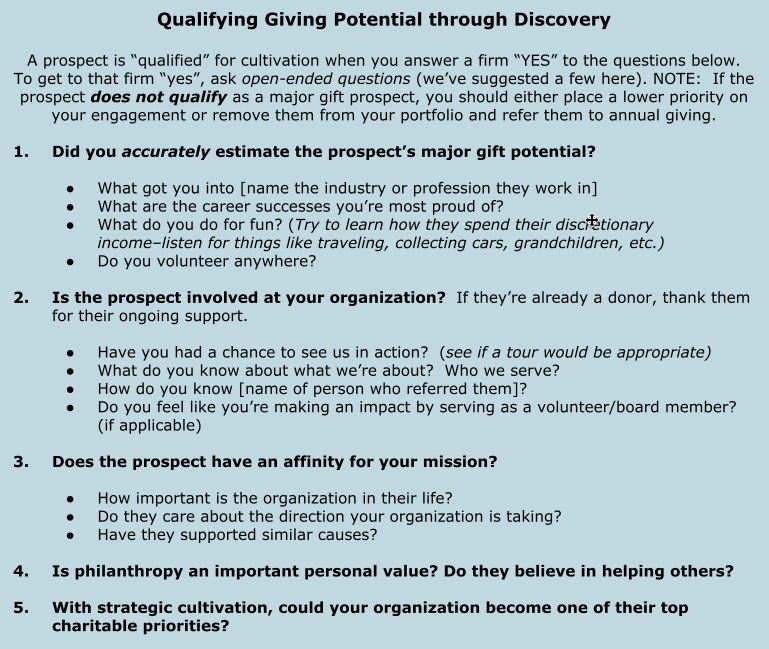
Set the Tone for the Ask with a Great Discovery Call.
Your FIRST conversation with a prospective donor (a.k.a. the discovery call) is the most important one. It’s your first chance to tell a motivating story about the work of your organization and learn about the prospect’s passions and goals. When you make a great discovery call, you’ll form the real connection that sets the tone for your ask for support.
A discovery call is ALSO a qualification call. You’re not just determining there’s chemistry between the prospect and your cause. You’re also confirming the prospect’s gift potential.
So YES, there’s a lot riding on that first contact, but it doesn’t have to be hard.
Seven Pro Tips for Great Discovery Calls
1. Do your homework.
Learn as much as you can about your prospect so that you know what to talk about and what questions to ask during the visit. Here are some examples of what to look for:
- Wealth (assets, net worth estimates, business information)
- Philanthropy (the prospect’s giving history, including amounts, recipients, cause types)
- RFM Analysis (the recency, frequency, and amount of their giving to your organization)
- Propensity Ratings (propensity ratings indicate things like their likelihood of giving in the next 12 months, or if they have a high lifetime giving value, and more).


2. Plan to come away with answers.
Remember, you’re not only making a connection, you’re qualifying the prospect’s potential–this sets their priority in your fundraising efforts.


3. Set a clear agenda.
The first five minutes of a discovery call set the tone for the rest of the visit. Start by quickly sharing your plans, so it’s clear to your prospect that you respect their time.
After introducing yourself and thanking them for taking the time to meet with you, you might say, “This visit is for me to get to know what you care about and want to accomplish when it comes to [name of your organization]. I’d also love to tell you a little about the work we’re doing and hope to do with your help. If, at the end of our visit, we want to continue our discussions, we can plan to meet again.”
4. Make it a two-way conversation, but LISTEN more than you talk.
- Avoid asking “yes” or “no” questions. You want them to share what they’re thinking and feeling about your cause.
- Validate the concerns and/or needs they share. You want them to feel heard and understood. Try a phrase like, “Wow, it sounds like your heart goes out to the children who are going hungry in our community.”
- Don’t run through your questions like a robot. Work them into the conversation naturally, and allow plenty of time for discussion in between each one. Your prospect should feel heard and understood, not grilled.
5. End on a high note.
Leave the prospect with a good feeling about your organization and give them the sense that this is the beginning of a meaningful relationship.
- Share how philanthropic support has helped your organization deliver on its mission in the past. You want them to see themselves in the story so they can imagine how they can impact the future with their generosity.
- Summarize what the prospect shared with you during the call to show that you clearly understand what they care about. Underline how your organization’s work can help them fulfill their dreams for good outcomes.
6. Ask for another visit.
You’ll need to think on your feet for this one. The idea is to take what you learned from the prospect during the visit and create an opportunity to keep the conversation going. For example:
- Set up a time for a tour of your facilities to see you in action.
- Arrange for a visit with one of your clients so that they can share their story.
- Schedule a meeting with a key volunteer, service leader, or organization leader.
7. Follow up.
Be sure to send a note thanking the prospect for their time. And, of course, set up that next visit/meeting!

DID YOU KNOW?
DonorSearch Ai and DonorSearch’s machine learning software will provide you with accurate insights to pre-qualify gift potential and help you concentrate on building your strongest relationships.
Want to know more about DonorSearch and DonorSearch Ai? Click GET A DEMO below.
